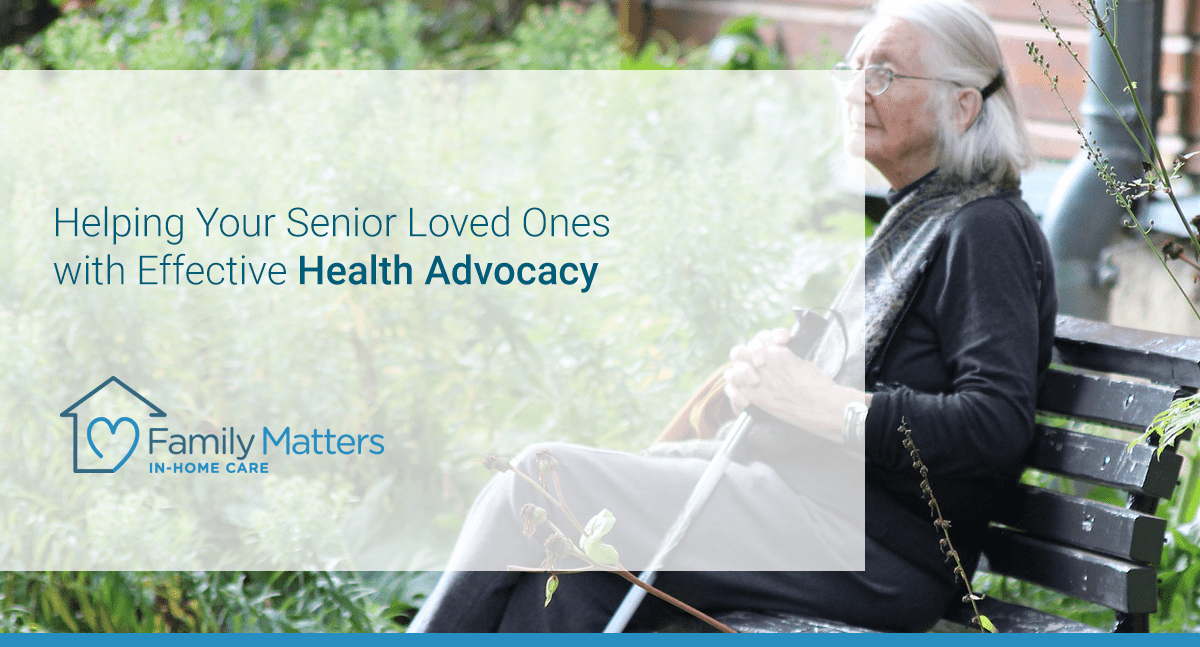
Helping Your Senior Loved Ones With Effective Health Advocacy
We all know how difficult it can be to keep track of doctor recommendations, medications, advice, insurance, and costs when we’re dealing with our own medical care. Compound that with the confusion of dementia or reduced short term memory, and a decreased ability to communicate their needs and challenges, and the process for your senior becomes even more daunting. Your loved one depends on someone to help keep the big picture straight.
How can you be an effective advocate for your loved one?
Most importantly, you need to care. When you care about their health and general well-being, you are more inclined to ask the deeper questions, seek out additional opinions, research other approaches, and push back on unnecessary expenses. Other helpful traits to have are good organizational skills, some free time, physical aptitude to bring your senior to and from multiple appointments, and social skills to work with the various health professionals who are collaborating on your senior’s care plan.
Health advocates, whether they are paid professionals, free placements, or family members, provide several services:
- Coordinate with Medicaid, Medicare, and insurance companies
- Help get the patient to doctor visits, testing, and procedures
- Track prescriptions and help ensure they take proper amounts at correct times
- Research alternative therapies and treatments & discuss options with the senior and their medical team
- Make sure that things like Power of Attorney and Living Wills are in place
Paid advocates can provide the following additional help:
- A complete assessment with care recommendations (usually completed in the senior’s home)
- Assistance finding appropriate housing and transitioning to the new living environment such as an assisted living facility
- Reviewing all bills from medical professionals, hospitals, and insurance companies for accuracy
- Identifying and securing community services such as Meals on Wheels, adult daycare, or wheelchair transportation services
- Handling paperwork to ensure service delivery
If you are unable to hire professional advocacy assistance, many times local senior centers can help. Often, they are familiar with resources and are committed to helping your senior maintain some level of independence. Senior centers administer a range of programs such as congregate meals, transportation services, and community education.
In addition, they will need the daily personal health advocacy provided by checking in on their routine, health, weight and mobility, and prescriptions. You are an extension of your senior’s mind and spirit, and will be able to be a better advocate for their health when in the doctor’s office or at the pharmacy. Even if you are working with a professional advocate, you will be able to share this information.
One of the most important ways to advocate for your senior daily is helping with medication. Keep an eye out for these deterrents to taking their medications appropriately:
- Memory. Brainstorm creative ways that will help them remember to take the medications – alarms, notes, or pill boxes.
- Vision. Sometimes they simply can’t see well enough to read the correct dosing. Ask the pharmacist to print the labels in large print.
- Hearing. They may not want to admit that they can’t hear the instructions the pharmacist or doctor is giving them. Be their ears.
- Dexterity. Can they open the bottles easily and are the pills pre-split? Do they need your help administering eye drops or inhaled medications?
- Swallowing. If your loved one has difficulty swallowing, follow up with their medical team to determine if there is a liquid, patch, or other form of dosing that can be used
What is a Professional Health Advocate?
They are often individuals with higher degrees in nursing, social work, or gerontology that help seniors with a variety of issues, including those related to medical, financial, and insurance problems. They may work out of an office, but will usually make home or facility visits. The best ones are kind, knowledgeable, and results-driven when it comes to getting your senior’s needs met.
Questions for the Medical Team about Medications & Treatment
- How will I know that the treatment is working?
- What are the potential side effects?
- How will this medicine interact with other medications that my loved one is taking?
- What is the cost of the medicine or treatment prescribed? Are there less expensive alternatives?
- Do you have written information about the treatment that we can take home?
If you or your family member is considering in-home care as part of a plan to age in place, contact Family Matters In-Home Care today for a free consultation. Our team is dedicated to supporting your family and helping older adults enjoy life in the comfort of their own home for as long as possible.
Some of the services offered by Family Matter In-Home Care include: Alzheimer’s & Dementia Care, Bed & Wheelchair Transfer Assistance, Companionship, Housekeeping & Meal Preparation, Personal Care, Recovery Care, and Transportation.
Serving the San Francisco Bay Area and Greater San Diego, Family Matter In-Home Care has offices throughout California including: Campbell, CA, Roseville, CA, San Marcos, CA, and San Mateo, CA.
Sources
- https://cdn2.hubspot.net/hubfs/1708580/Marketing%20Monthlies/PDFs/0520-HealthAdvocacy.pdf
- https://www.hopkinsmedicine.org/health/wellness-and-prevention/the-power-of-a-health-care-advocate
- https://seniors.lovetoknow.com/senior-care-advocates
- https://blog.ioaging.org/aging/patient-advocacy-need-someone-go-bat-senior/
- https://www.ncoa.org/national-institute-of-senior-centers/tips-for-senior-centers/connecting-seniors-to-economic-assistance/
- https://www.caregiver.org/resources-health-issue-or-condition
